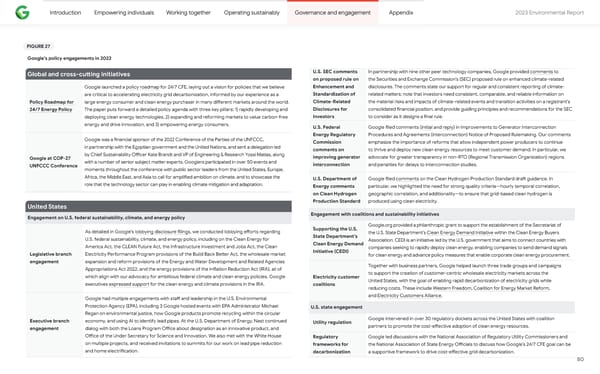Introduction Empowering individuals Working together Operating sustainably Governance and engagement Appendix 2023 Environmental Repo爀琀 FIGURE 27 Google’s policy engagements in 2022 U.S. SEC comments In pa爀琀nership with nine other peer technology companies, Google provided comments to Global and cross-cu琀琀ing initiatives on proposed rule on the Securities and Exchange Commission’s (SEC) proposed rule on enhanced climate-related Enhancement and disclosures. The comments state our suppo爀琀 for regular and consistent repo爀琀ing of climate- Google launched a policy roadmap for 24/7 CFE, laying out a vision for policies that we believe Standardization of related ma琀琀ers; note that investors need consistent, comparable, and reliable information on are critical to accelerating electricity grid decarbonization, informed by our experience as a Climate-Related the material risks and impacts of climate-related events and transition activities on a registrant’s Policy Roadmap for large energy consumer and clean energy purchaser in many di昀昀erent markets around the world. Disclosures for consolidated 昀椀nancial position; and provide guiding principles and recommendations for the SEC 24/7 Energy Policy The paper puts forward a detailed policy agenda with three key pillars: 1) rapidly developing and Investors to consider as it designs a 昀椀nal rule. deploying clean energy technologies, 2) expanding and reforming markets to value carbon-free energy and drive innovation, and 3) empowering energy consumers. U.S. Federal Google 昀椀led comments (initial and reply) in Improvements to Generator Interconnection Energy Regulatory Procedures and Agreements (interconnection) Notice of Proposed Rulemaking. Our comments Google was a 昀椀nancial sponsor of the 2022 Conference of the Pa爀琀ies of the UNFCCC, Commission emphasize the impo爀琀ance of reforms that allow independent power producers to continue in pa爀琀nership with the Egyptian government and the United Nations, and sent a delegation led comments on to thrive and deploy new clean energy resources to meet customer demand. In pa爀琀icular, we by Chief Sustainability O昀케cer Kate Brandt and VP of Engineering & Research Yossi Matias, along improving generator advocate for greater transparency in non-RTO (Regional Transmission Organization) regions Google at COP-27 with a number of senior subject ma琀琀er expe爀琀s. Googlers pa爀琀icipated in over 50 events and interconnection and penalties for delays to interconnection studies. UNFCCC Conference moments throughout the conference with public sector leaders from the United States, Europe, Africa, the Middle East, and Asia to call for ampli昀椀ed ambition on climate, and to showcase the Google 昀椀led comments on the Clean Hydrogen Production Standard dra昀琀 guidance. In U.S. Depa爀琀ment of role that the technology sector can play in enabling climate mitigation and adaptation. Energy comments pa爀琀icular, we highlighted the need for strong quality criteria—hourly temporal correlation, on Clean Hydrogen geographic correlation, and additionality—to ensure that grid-based clean hydrogen is produced using clean electricity. Production Standard United States Engagement with coalitions and sustainability initiatives Engagement on U.S. federal sustainability, climate, and energy policy Google.org provided a philanthropic grant to suppo爀琀 the establishment of the Secretariat of Suppo爀琀ing the U.S. As detailed in Google’s lobbying disclosure 昀椀lings, we conducted lobbying e昀昀o爀琀s regarding the U.S. State Depa爀琀ment’s Clean Energy Demand Initiative within the Clean Energy Buyers State Depa爀琀ment’s U.S. federal sustainability, climate, and energy policy, including on the Clean Energy for Clean Energy Demand Association. CEDI is an initiative led by the U.S. government that aims to connect countries with America Act, the CLEAN Future Act, the Infrastructure Investment and Jobs Act, the Clean companies seeking to rapidly deploy clean energy, enabling companies to send demand signals Legislative branch Electricity Pe爀昀ormance Program provisions of the Build Back Be琀琀er Act, the wholesale market Initiative (CEDI) for clean energy and advance policy measures that enable corporate clean energy procurement. engagement expansion and reform provisions of the Energy and Water Development and Related Agencies Together with business pa爀琀ners, Google helped launch three trade groups and campaigns Appropriations Act 2022, and the energy provisions of the In昀氀ation Reduction Act (IRA), all of to suppo爀琀 the creation of customer-centric wholesale electricity markets across the which align with our advocacy for ambitious federal climate and clean energy policies. Google Electricity customer United States, with the goal of enabling rapid decarbonization of electricity grids while executives expressed suppo爀琀 for the clean energy and climate provisions in the IRA. coalitions reducing costs. These include Western Freedom, Coalition for Energy Market Reform, and Electricity Customers Alliance. Google had multiple engagements with sta昀昀 and leadership in the U.S. Environmental Protection Agency (EPA), including 3 Google hosted events with EPA Administrator Michael U.S. state engagement Regan on environmental justice, how Google products promote recycling within the circular Executive branch economy, and using AI to identify lead pipes. At the U.S. Depa爀琀ment of Energy, Nest continued Utility regulation Google intervened in over 30 regulatory dockets across the United States with coalition engagement dialog with both the Loans Program O昀케ce about designation as an innovative product, and pa爀琀ners to promote the cost-e昀昀ective adoption of clean energy resources. O昀케ce of the Under Secretary for Science and Innovation. We also met with the White House Regulatory Google led discussions with the National Association of Regulatory Utility Commissioners and on multiple projects, and received invitations to summits for our work on lead pipe reduction frameworks for the National Association of State Energy O昀케cials to discuss how Google’s 24/7 CFE goal can be and home electri昀椀cation. decarbonization a suppo爀琀ive framework to drive cost-e昀昀ective grid decarbonization. 80
 2023 Environmental Report Page 79 Page 81
2023 Environmental Report Page 79 Page 81